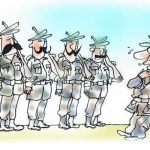HULL DOWN
A Tank, A Recoilless Gun and Two Brave Men
A military war exercise was going on and the corps commander was peering through Bushnell binoculars. The tanks were grinding forward in the wide moraine followed by infantry combat vehicles, which had sticks of agile riflemen crouching inside them. The infantry jumped out of the tanks and started running towards a low line of hills and there was the shouting, loud crash and bang of simulated battle. The attack went in with decimating flash, might and fury. Clouds of dust rose, a hurricane of violence erupted. The wide hill shook to the pell-mell sound of battle as hard infantrymen took their bayonets to the enemy stronghold. Green very lights of victory shot into the blue sky.
Soon the dust covered forms of the officers who were spearheading the attack came to the exercise grandstand. Eager young men of Hodson’s Horse in signature black dungarees with the flush of excitement emblazoned on their beaming faces. The Corps commander, Lt General V K Singh, with the dour faced Changezi looking Sardar Brigade Commander in tow, came up to meet the young officers. He singled out a tall, very handsome lieutenant and asked, “Could you see the enemy objective from your tank?” “Yes Sir, rather clearly.” came the confident reply.
The corps commander exchanged a wry glance with the Changez Khan look-alike brigade commander. “How so amidst all the spiralling dust all around?” said the general. “Sir I opened the turret hatch and stood out.”
The general quizzed the lieutenant further, the voice of experience testing the zip of youth. The lieutenant manufactured new and new tank tactics on the spot like a young Liddell Hart. The Changezi brigade commander heard in dazed silence as the tall fellow recited the tank warfare manual, chapter and verse, or at least his personalized version of it. At last, the impressed and aghast corps commander said,
“Young man, I can see that you are trying to confuse me but full marks for your confidence.” and moved on. I remember that scene from fifteen years ago and I took an instant liking for the handsome and swashbuckling lieutenant. We find ourselves in the same station again. I receive a call from him. He asks in his hurried way of talking,
“Ally Sir, yeh batao abhi kya karr rahey ho.?” He asks in a running manner. I give some vague reply.
He says,”Accha free ho naa, eight thirty golf-hut with maam. You have to come. I have called my golf buddies mostly. Sorry for last moment invite, but all my things happen in the last moment only.” He hangs up.
I look at my watch. It is quarter to eight. The golf hut is beautifully lit with subdued green light. The light bathes softly on the frill of acacia trees all around and the view from the wide terrace is that of a king’s garden. There is a senior lady who is standing alone. Her husband has just retired as the station commander. I start talking to her and ask her where they are staying. They are staying outside the cantonment in the personal house of another officer who too was the commander of our station long ago. He had built a house very near the cantonment. He has been gone from the world for many years now. She takes a name, Brigadier Kaushik. I had heard the name before. The story comes blowing like a wind from half a century ago. I had heard it from the mouth of an RCL gunner of 5th Battalion, the Sikh Regiment. The battalion had been spread out with all four companies up with all three platoons of each up holding ground on the line of control in Chambb. Pakistani big guns opened up around eight p.m. on the night of 3rd December 1971. A night-long rain of shells that ploughed up the Indian defences followed; the cold dawn found a Pakistani armoured brigade lined up in front of Chambb, poised to overrun the Indian positions.
The tanks had appeared out of nowhere in great numbers, now they stood like black beetles on the far end of the minefield ready for the final heave that would see them breaking through the poorly held Indian line. The Indians were on the low ridges and they had been bombarded throughout the night. Nothing could have survived such a pulverizing rain of TNT and steel. The Pakistani army stood arrogantly confident of picking the cherry of Chammb that day. The Shermans of Pakistani 18 PVAO (Prince Victor Albert’s Own) Cavalry stood awaiting the signal to add yet another battle honour to their colours.
Havildar Rachpal Singh sat behind his RCL jeep that they had hidden in a deep trench. Luckily, the jeep had survived the night’s bombardment spells. The Sikhs had dug in very deep and cleverly, as if they had a premonition of things to come, Rachpal and a few sepoys were filling craters leading to the firing bays. The Pakistani artillery started shelling again, the grim orchestra playing before an attack. The sepoys panicked and ran, jumping back into the trenches.
He let loose a curse on them and kept levelling the thigh deep craters. He worked in a trance, ignoring the bursting shells. He heard a clanking of tracks, dim at first and then louder. The unmistakable grind and screech of steel chain and the heavy throb of the engines.
The enemy was approaching fast he thought; he feared to look up as he swung the stock of his spade. Had he lost the sense of time? The enemy tanks had been lining up far. Had they already crossed the minefield? All about him was silence, not a soul anywhere above the ground. Had everyone already retreated and left him alone? Sweat poured down his nose onto his moustache and then trickled into his thick black beard. He thought of Nanak as he worked. The tank’s noise was almost upon him. He threw down his spade and looked up ready for the worst, the end.
“Sardar, get out of the way.” shouted the Deccan Horse Captain who was riding on the hull of his tank. Rachpal looked up to see a cheerful tankman in a black dungaree smoking a cigarette atop the T-55. He saluted and picked up his shovel.
“Get your fucking jeep gun out, we will have the whole fucking Yahya Khan brigade on our fucking head soon.”
He yelled as he took the tank ahead slowly, creeping behind the sandbank. Rachpal picked up his carbine and went to collect the crew. They had the jeep out in their firing position. The Pakistani Shermans crept forward cautiously. A tank went over a mine and there was a loud explosion. The attacking tanks halted, and after a few minutes started creeping forward again amidst the cloud of blue smoke in the cold morning.
Rachpal ran to the lone T-55; the Pakistani tanks were very close now. He wanted the tank to fire; he didn’t want to fire first lest he missed and gave away the position of his RCL jeep.
“Saabji tank aggey haigey tussi fire karo.” Kaushik was sitting on the cupola and smoking a Panama, oblivious of everything as if in the bar of his regimental mess.
“Aaney do, aaney do, waqt aaney par karwai hogi.” replied the tank captain. “Mera fire ke baad aap log fire kholna.”
Rachpal ran back to the RCL jeep. The Pakistani Shermans looked bigger than ever, their jam tin like high topped cupolas distinct in the midmorning sun. Rachpal’s head swam when he saw almost forty tanks of the enemy grinding towards them. The captain sat quietly on his tank facing west with a cigarette in his mouth. He saw the thin pennant fluttering on the Pakistani tank. He lazily put on his headphones and drawled to his gunner,
“Three hundred yards, 12 O’ clock, broadside, tank with jhandee, fire. “The 100 mm gun of the Russian T-55 spat out. The Sherman’s cupola flew off like a joker’s hat.
Rachpal levelled his 0.50-inch spotter at the forward most tank and took him in range. The pipe of the RCL gun got lit like a ton of gasoline catching fire and the heavy tank busting shell ran home with final summons. After the first hit Rachpal’s nerves got strong, the nervous, watery fear of inaction melted out of his body and the black tar of vital and death-dealing evil blood that flows in man’s veins when he is on the job of destruction erupted like a rich fountain in his soul.
The enemy line had tottered and their tanks seemed frozen. They saw only a line of low sandbanks in front of them with no sign of the Indians; but they were there. Five of their frontmost tanks were knocked out and burned furiously; clouds of black smoke gushing out of those, while the long, red tongues of flame leaping out, roasted the crew alive.
Rachpal reversed the agile jeep and raced towards a clay tope, two hundred yards further down the service track. He had not gone twenty yards when enemy shells tore apart his previous position. Kaushik was easing his tank into another camouflaged fire ramp scooped into the sand bank. He started picking off the thin-skinned Shermans, as they went round and round in circles like startled cockroaches. He stood in the open cupola and kept picking up tank after tank. The enemy started withdrawing, putting more and more distance between them and the Indians. By sunset the no man’s land looked like Nigambodh Ghat, where the smoke from the burning hulks of the Shermans blew pell-mell riding the wind.
The story raced through my mind at the mention of Kaushik’s house. Since I heard it from Rachpal’s mouth, I had been awed by the Rajkumar-like sangfroid of the captain in the heat of battle, “Sahi waqt aaney parr hum karwai karengey jaani.”
How utterly ballsy is that when you have an armoured regiment five minutes away from overrunning your positions. Both Rachpal and Kaushik got Vir Chakras; they deserved more.
But I have diverged a lot; let me come to the beginning. The tall strapping lieutenant is now a lieutenant colonel. He has been approved for the colonel’s rank; that’s why he threw this party at short notice. And this is no ordinary event anywhere in the regular armies of the world.
Sahil Butalia’s grandfather commanded Hodson’s Horse, his father commanded Hodson’s Horse and now the grandson will also command Hodson’s Horse. It’s the only unique case of its kind in the annals of Indian army.





